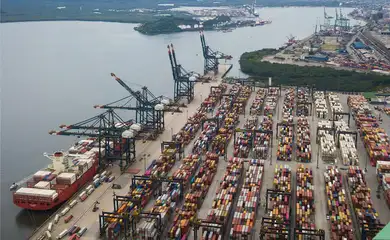Unilateral measures harm economy, says Brazil's Finance Minister

Brazil's Finance Minister Fernando Haddad stated that unilateral measures such as the trade tariffs imposed by US President Donald Trump harm the global economy. He added that the impact on the country's economy is still unclear, as the Brazilian government is gathering data before deciding whether to respond to the 25 percent surcharge on steel and aluminum imports.

"Unilateral measures like these are seen as counterproductive to global economic growth. The world economy suffers from this retraction and the ongoing deglobalization," Haddad said Tuesday (Feb. 11). "This doesn’t mean endorsing the old model of globalization, which created other imbalances, but rather advocating for a sustainable form of globalization—socially and environmentally."
Haddad stated that the Ministry of Development, Industry, Trade, and Services is compiling information on Trump’s decision. He added that data on the impact on Brazil’s economy will be presented to President Luiz Inácio Lula da Silva, who will make the final decision.
Emphasizing that the steel and aluminum tariffs impact more than just Brazil, Haddad said the Brazilian government has room to negotiate, following G20 (group of the 19 largest economies on the planet, plus the European Union and the African Union) guidelines.
"It’s not a decision specifically against Brazil, [the steel and aluminum surcharge] applies broadly," Haddad said. "We've been monitoring the reactions of Mexico, Canada, and China. In line with our G20 proposals, we plan to return to the negotiating table with similar initiatives. I believe there is room for negotiation."
The minister noted that Brazil's Ministry of Foreign Affairs is also involved in the discussions and that no assessment of the impact on the Brazilian economy has been made yet. As for the response from the steel and aluminum industries, Haddad said he plans to meet with affected sectors after returning from his trip to the Middle East this week and next.
CNI
In a statement, Brazil's National Confederation of Industry (CNI) expressed regret over Trump’s decision. The organization noted that it directly impacts Brazilian industry, as Brazil is the fourth-largest exporter of iron and steel to the US, which accounts for 54 percent of the country’s foreign sales of these products.
The confederation emphasized that Brazil poses no commercial threat to the United States. "Since 2008, the trade balance has favored the US, unlike its trade relationships with Canada, China, and Mexico. In 2024, Brazil exported $40.4 billion to the US and imported $40.7 billion," the statement read.
CNI stated that it will seek dialogue and negotiate alternatives to reverse the tariff increase. "Dialogue is preferable to retaliatory measures that could harm other sectors reliant on US imports for Brazilian production," said CNI President Ricardo Alban in the statement.






